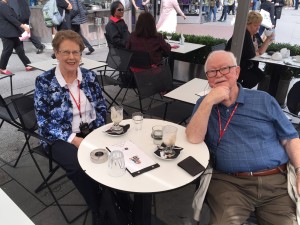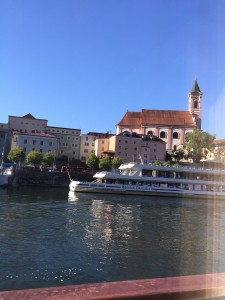 Last September we took a cruise on the Danube and the Rhine Rivers. We started off in Budapest, Hungary and finished in Amsterdam, The Netherlands. The trip lasted two weeks and was lovely.
Last September we took a cruise on the Danube and the Rhine Rivers. We started off in Budapest, Hungary and finished in Amsterdam, The Netherlands. The trip lasted two weeks and was lovely.
Living, eating, drinking and floating along was very relaxing. The boat stopped every day in a different city. Most of us got off and went with local guides to see the sights.
The excursions were very interesting. In the larger cities, the guides would first take us on a bus for an overview of the entire area. Then we would get off in the older parts of town and walk around. In the smaller towns, we were able to skip the bus part and walk right into town.
The guides were very well educated, spoke several languages and knew a lot of local history. They could easily talk about what life was like four or five hundred years for the people living there. They always shared lots of interesting details and usually a few jokes.
I started to wonder, as I had more and more of these experiences, why would such educated people be so happy and willing to work as guides? I don’t think they were paid very much. They were always very happy with the tips we gave them in Euros.
I kept turning this question over in my mind trying to think of a polite way to ask. Finally I found a solution. In the next town, as we were walking around, and I was looking down at the cobblestones so I wouldn’t trip, I started working my way up toward the front of the group.
 I had to wait for the guide to stop talking. She knew so much and was so concerned that we learn every detail that she very rarely paused, even for a breath. She didn’t ever seem to be silent, even when we were making a difficult climb up a steep road to the castle at the top.
I had to wait for the guide to stop talking. She knew so much and was so concerned that we learn every detail that she very rarely paused, even for a breath. She didn’t ever seem to be silent, even when we were making a difficult climb up a steep road to the castle at the top.
But, finally she did stop talking for a second. I sensed this was my big chance. So, before she could start in again, I started talking. I told her I enjoyed the tour, was learning so much, and was so impressed with how comfortable she was in English. Then I asked my question: Of all the jobs available, what was it about being a guide that made her choose this?
“Oh,” she confided, “there are no jobs…” Apparently most of these towns had no business or industry, other than that related to tourism. If they wanted to live there, they had to find work. Being a guide or working in the tourism industry were the only opportunities available.
In a few other towns, I asked the guides there the same question. They all said the same thing. Yes, the towns were beautiful, historic and they liked living there. But no, there were no other opportunities to use their language skills and university training.
Do you find this surprising?
There are and always have been cities where one industry is the main source of income for the residents. So, I don’t find it surprising that tourism had taken over in some areas. What I hope is that either the city is able to broaden its industry base or that the current one doesn’t go bust.
Claire, you remind me of the good fortune we have. We live in a land filled with abundance.
I enjoyed to read this story.